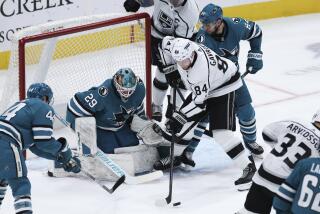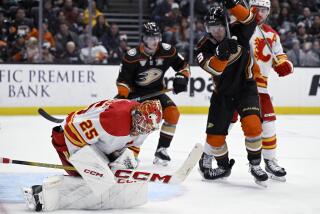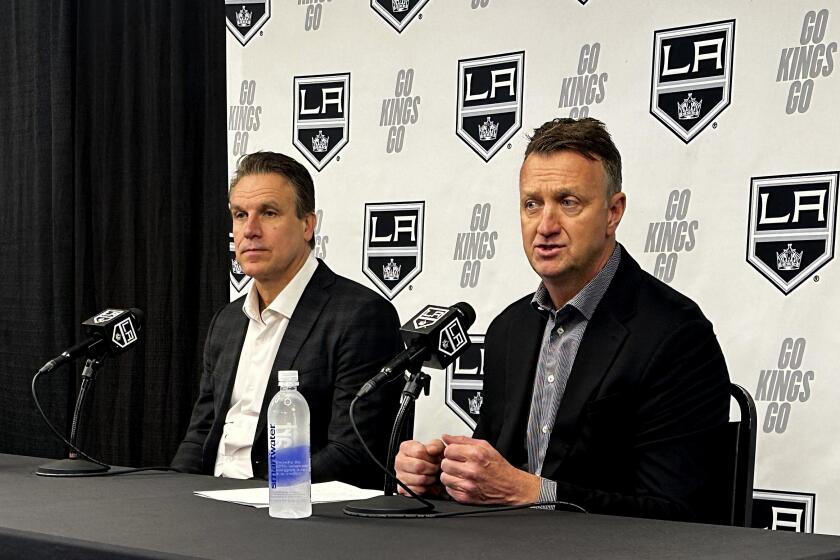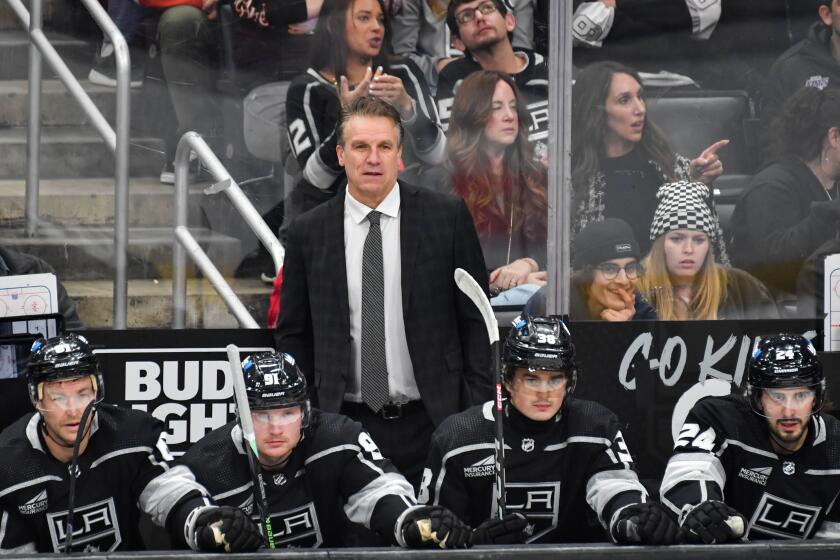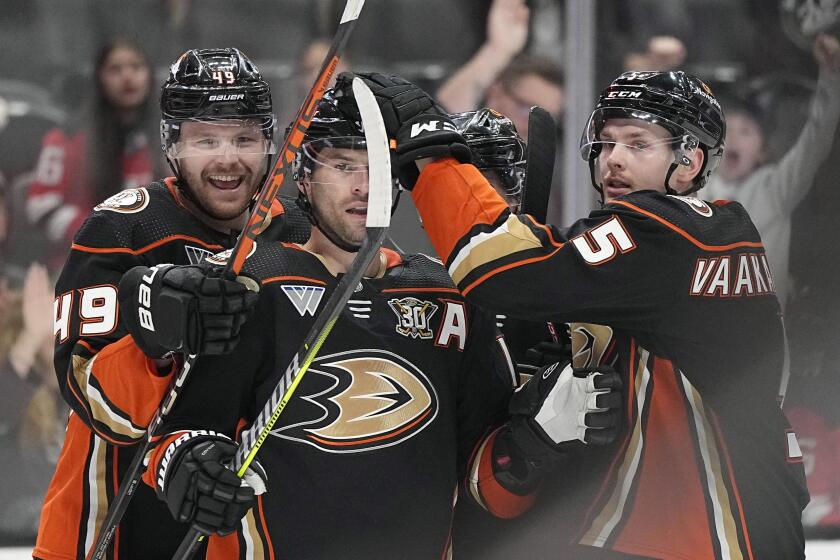Ducks Are In for a Ride With Complex Burke
When Brian Burke was the NHL’s director of hockey operations, visitors to his New York office were greeted by a vivid picture of a hockey player with wild hair and a bloody jersey skating off in apparent pursuit of unseen and unsuspecting prey.
Taken during the 1977-78 season, when he played for the American Hockey League’s Maine Mariners, the photo was intended as much to intimidate those brave enough to enter his lair as to laugh at himself. His nod to his season in pro hockey depicted not a goal -- he had three, with eight points and 60 penalty minutes in 65 games -- but a crazed creature with blood in his eyes.
Behind his desk sat an eloquent, Harvard-educated attorney with neatly combed hair and a suit that spoke of expensive tailoring. That’s the Burke who stood in front of a microphone Monday to accept the titles of executive vice president and general manager of the Mighty Ducks. But the rough-edged Burke, the one known to descend to bullying and bluster, is never far beneath the surface.
That picture is never far away, either, and he plans to display it in his new office in the Arrowhead Pond.
“It’s packed away somewhere,” he said, smiling.
Burke clearly enjoys presenting contradictory faces to the world.
There’s the lucid lawyer, and the man who called a Vancouver reporter a maggot, a factor in the decision by Canuck executives to let him go when his contract expired a year ago. There’s the thoughtful observer who offered sensible solutions to the NHL’s labor woes as a commentator for Canada’s TSN network, and the hothead who can teach sailors new swear words.
He’s passionate about his family and got permission from owners Henry and Susan Samueli to spend two weekends a month in Boston with his four children from his first marriage. He’s also a fervent hockey fan who bought Duck season tickets through their first three seasons -- and did the same for the Minnesota Wild -- because he wasn’t sure how they’d fare and he thought it important to show his support. He gave the tickets to charities, as he’ll do with the four Duck season tickets he plans to buy for next season.
He pledged to be honest with the media, “except around the entry draft, when I can and will lie freely if I can throw another team off the scent,” he said. But he has warred with the media too.
This year he sued the New York Post and writer Larry Brooks for defamation after Brooks wrote that Burke had gone to the Canucks’ locker room and told players to go after Colorado forward Steve Moore in retaliation for a hard hit by Moore on Vancouver’s Markus Naslund on Feb. 16, 2004.
In their next game, on March 8, Vancouver’s Todd Bertuzzi sucker-punched Moore, who suffered a concussion and a broken bone in his neck. He hasn’t played since.
Moore filed a civil suit in Denver against Burke, Bertuzzi, Vancouver forward Brad May -- who had indicated there was a bounty on Moore -- Canuck Coach Marc Crawford and the partnership that owned the team. That suit and the defamation case are winding their way through the courts.
Any monetary award he might win in the defamation suit will go to charity, Burke said. And he hasn’t backed off from his support of Bertuzzi.
“My viewpoint on Todd has been very vocal and very strong,” Burke said, “but I no longer work for the Vancouver Canucks, and this is Vancouver’s issue right now.”
He did solve many issues for the Canucks’ business operations. The team had about 7,600 season tickets in 1998-99 and averaged losses of $30 million (Canadian) a year, but in 2003-04 the team and its arena, GM Place, made about $30 million.
On the ice, Burke’s Canucks played a freewheeling style augmented by muscle, a style he wants the Ducks to adopt. But Vancouver won merely one of six playoff series during his tenure. That’s impossible to ignore after Burke won the Duck job over Neil Smith, who was general manager of the New York Rangers when they ended a 54-year Stanley Cup drought in 1994.
Burke attributed the Canucks’ postseason failings not to their style but to budget constraints that put him at a competitive disadvantage. That inequity, he said, will be eliminated in the new collective bargaining agreement.
“In Vancouver it was pretty clear. We only got to eat what we shot. If we couldn’t pay for it, we couldn’t have it,” he said.
“The first year I was there we lost to Colorado in four straight, and the first power play they had, the six players on the ice, their combined salaries were double the team I dressed that night. The next year we lost to Detroit, and I think their payroll was $66 million and I think we were $36 million. The next year we beat a $60-million team, St. Louis, and lost to Minnesota. Last year, without Todd Bertuzzi, we lost to Calgary in the first round in overtime in Game 7. Had we had Todd Bertuzzi, with all due respect to Calgary, we would have won that series.
“Given the budget I was given in Vancouver, we accomplished as much success as we could.”
Henry Samueli, in explaining why he hired Burke, said he wanted a team with passion “and that starts at the top.” He’ll get passion. And more Burkes than he might have bargained for.
More to Read
Go beyond the scoreboard
Get the latest on L.A.'s teams in the daily Sports Report newsletter.
You may occasionally receive promotional content from the Los Angeles Times.
